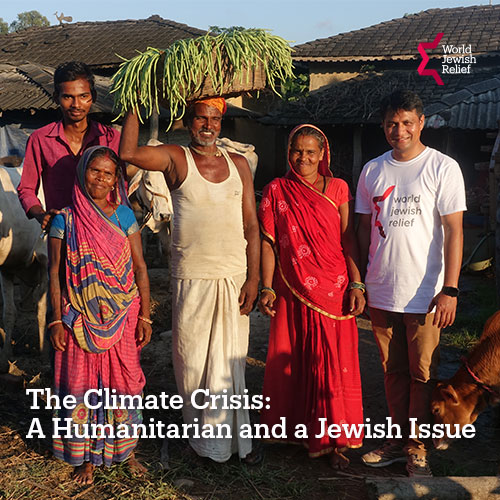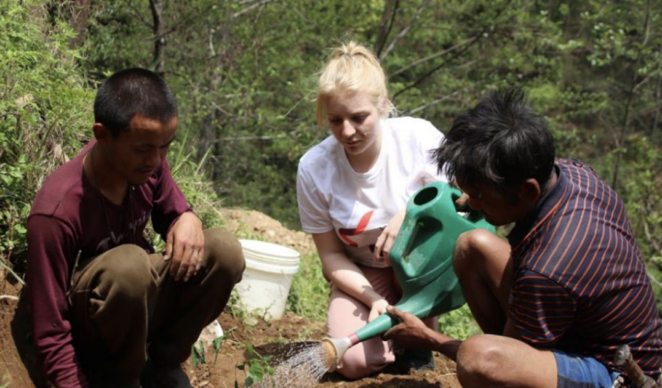The Climate Crisis: A Humanitarian and a Jewish issue

Introduction
This report makes the case for why faith-based, humanitarian charities should be adjusting their work to ensure they are building long-term climate resilience, rather than only focusing on short-term, emergency responses.
To do so, it explains the basics of climate science for a non-expert audience, summarises the expected impacts of the climate crisis and the humanitarian imperative to address them, and explains how key Jewish values are being threatened by the climate crisis. It then sets out how World Jewish Relief is structuring its own work on resilience building, mitigation, adaptation and preparedness, to set an example for how their own organisation could begin to enter such a huge sphere of work.
This article is abridged from the original text in the report The Climate Crisis: A Humanitarian and a Jewish issue which can be downloaded from the right hand column. Please access the original text for more detail, research purposes, full references, or to quote text.
Why is the climate crisis an issue in the Jewish tradition?
The Jewish Imperative to Act:
The climate crisis is unprecedented, yet it calls on Jews to act, for reasons that are ancient, familiar, and deeply rooted in Jewish tradition. Central Jewish values, including saving life, protecting the weak and vulnerable, not hurting our neighbours, tzedakah, hesed and caring for God’s creation, come into play when we act in response to the climate crisis. These are values that have inspired World Jewish Relief’s work for decades, and they motivate the charity as they seek to engage more deeply with the climate issue and its impacts on many of the poorest and most vulnerable people in our world.
Saving Life:
Saving life, pikuach nefesh, states that each human being is a unique, irreplaceable creation of God, endowed with infinite worth. The rabbis say that Saving life overrides almost every prohibition in the Torah. Advice is to break Shabbat to save a life, even if there is a mere possibility of life-threatening danger and even if only a few more hours of life are gained by doing so. It is estimated that the climate crisis is already killing up to 100,000 people per year. Acting to prevent the worst impacts is mandated by the central Jewish value of saving life. “One who saves a single life, it is as if they have saved the whole world; whereas one who destroys a single life it is as if they have destroyed a whole world.” (Mishnah Sanhedrin 4:5)
Protecting the most vulnerable people, including those who are living in poverty, marginalised people and older people:
The impacts of the climate crisis will fall disproportionately on the world’s most vulnerable people, including people living in poverty, farmers, marginalised groups, women, people affected by conflict, refugees, indigenous groups, young and older people. The Torah urges the community to look after people who are vulnerable. It repeatedly stresses a duty to care for “the stranger, the widow and the orphan”. “The message of the Hebrew Bible is that civilisations survive not by strength but by how they respond to the weak; not by wealth but by how they care for the poor; not by power but by their concern for the powerless.
Climate Justice:
Many argue that a “just” outcome to the climate crisis must involve industrialised nations and corporations that have accumulated wealth through burning fossil fuels to contribute more to help those dealing with the consequences. Taking responsibility for damage done to others is a fundamental principle of Jewish law and ethics. Maimonides summarises by writing: “All of the Laws of Torts are concerned with putting an end to acts of injustice and with the prevention of acts causing damage. In order that great care should be taken to avoid causing damage, man is held responsible for every act causing damage deriving from his possessions or caused by an act of his, if only it was possible for him to be cautious and take care not to cause damage.” (Guide of the Perplexed, 3:40)
Climate science and impacts
According to the latest IPCC report, “it is unequivocal that human influence has warmed the atmosphere, ocean and land.” These warmer temperatures are having many impacts on the global climate, including:
- Higher average and maximum temperatures
- Longer and more severe heatwaves, wildfires, and drought
- Regionally varying changes in rainfall patterns leading to more extreme storms and floods, shifting monsoon seasons, and shifting agricultural calendars
These changes in climate are having broader impacts on the environment including disruptions to oceans, loss of biodiversity and degradation of land. These environmental changes are having devastating impacts on humans in terms of resource and food scarcity, conflict and migration and human health (see report for details). These disproportionately affect the world’s most vulnerable people.
The impact of the climate crisis on World Jewish Relief’s partner communities
The effects of the climate crisis are felt most acutely in low and middle income countries and by the most vulnerable communities within them. World Jewish Relief already works with many such communities, including older people in Eastern Europe, those dependent on rain-fed agricultural livelihoods in Eastern Africa, and communities hit by recurrent climate-related disasters.
- Older people living in Eastern Europe: Eastern Europe is experiencing higher risk of heatwaves, more intense precipitation, and flooding, alongside the existing problem of extremely cold winters. Older people are more likely to suffer ill health during a heatwave (with a higher risk of respiratory problems, dehydration, and challenges accessing food or emergency medicine), are less able to evacuate during a flood, and struggle to fund home adjustments for heat extremes. The programme participants live in high rise, poorly built flats, which are difficult to keep cool. This was especially severe during the Covid-19 lockdowns of summer 2021, when much of eastern Europe was hit by a record breaking heatwave.
- Farmers in Eastern Africa: Eastern Africa is experiencing warmer temperatures, more intense heatwaves, rainfall and floods, locust swarms, as well as higher rates of vector borne diseases such as Malaria and Dengue, and water borne diseases such as cholera and typhoid. Disrupted farming has already been reported by World Jewish Relief’s programme participants. For example, farmers in Wajir, Northern Kenya have lost incomes during a recent drought, while successive flooding in Rwanda has seen severe outbreaks of several diseases such as bacterial wilt and late blight that have damaged crops.
Jewish communal initiatives to address the climate crisis
The global transformations needed to reduce emissions require large-scale action by governments and corporations. However, individuals and communities are not powerless. In the UK the Jewish Community can strengthen their initiatives aimed at addressing the climate crisis and overseas, and can start conversations about climate science, impacts on humanitarian crises, and options for climate mitigation and adaptation, within our social circles, among business associates, and through public policy advocacy.
- Eco-synagogue: The UK cross-communal Eco-Synagogue initiative gives synagogues a simple road map for ensuring that their activities and assets are environmentally responsible, across the major areas:
- Community (Synagogue) Management commitment.
- Prayer & Teaching.
- Lifestyle.
- Land, Buildings & Consumables.
- Community & Global Engagement.
- Dorot: Dorot (meaning ‘generations’) is an ambitious new climate initiative launched by the Office of the Chief Rabbi and the United Synagogue aimed at reducing their environmental impact. It is comprised of seven projects which will be rolled out over 2022, covering tree planting, phasing out disposable plastic, rewilding, smart energy solutions, and more.
- Interfaith organizations: With over five billion followers and deploying vast resources, the world’s major religions are increasingly recognised as a powerful source of activism on the climate crisis. Interfaith organisations such as the FaithInvest are mobilising the world’s religions to take action on the climate crisis. Within such initiatives, Judaism has a significant moral voice as the oldest major faith and the progenitor of Christianity and Islam, which have over three billion adherents.
World Jewish Relief’s work to address the climate crisis

Photo: Programme participants in Nepal showing us how to plant drought resistant walnut saplings. Credit: CSRC (Community Self Reliance Centre), Nepal. https://csrcnepal.org/
World Jewish Relief recognises the urgent humanitarian and Jewish imperatives to do everything it can to protect some of the world’s most vulnerable people from further suffering due to the climate crisis. Over the past couple of years, we have worked towards three main goals:
- Partnering with local organisations in high climate risk countries, to implement Climate Resilience Programmes that enable communities to cope with the changing climate patterns
- Ensuring that every one of World Jewish Relief’s partners and programmes are considering environmental impacts when designing new livelihoods or humanitarian projects.
- Measuring and reducing our own carbon footprint, to minimise our contribution to the problem.
More information can be found on their website. https://www.worldjewishrelief.org/what-we-do/climate-resilience/
Suggested citation
Rabbi Yedidya Sinclair and World Jewish Relief, 2022. The climate crisis: a humanitarian and a Jewish issue. World Jewish Relief, 2022.
This report was commissioned by World Jewish Relief. Rabbi Yedidya (Julian) Sinclair consults on environmental and social compliance for infrastructure projects in the developing world. Previously, he was Vice President and Senior Economist at Energiya Global, a Jerusalem-based solar energy company focused on Africa. World Jewish Relief is also grateful to Rabbi Johnathan Wittenberg, who provided the foreword, and to the Pears Foundation, who have part funded their climate resilience work.
Further resources
- Considering religion and tradition in climate smart agriculture: Insights from Namibia
- World Disasters Report – Focus on culture and risk
- Community participation and monitoring
- Promoting Local Adaptive Capacity: Experiences from Africa and Asia
- Partnership for Governance Transition: Cultural Landscape of Bali
Related resources
- Considering religion and tradition in climate smart agriculture: Insights from Namibia
- World Disasters Report - Focus on culture and risk
- Community participation and monitoring
- Promoting Local Adaptive Capacity: Experiences from Africa and Asia
- Partnership for Governance Transition: Cultural Landscape of Bali
(0) Comments
There is no content